October 7
Harry Kroto
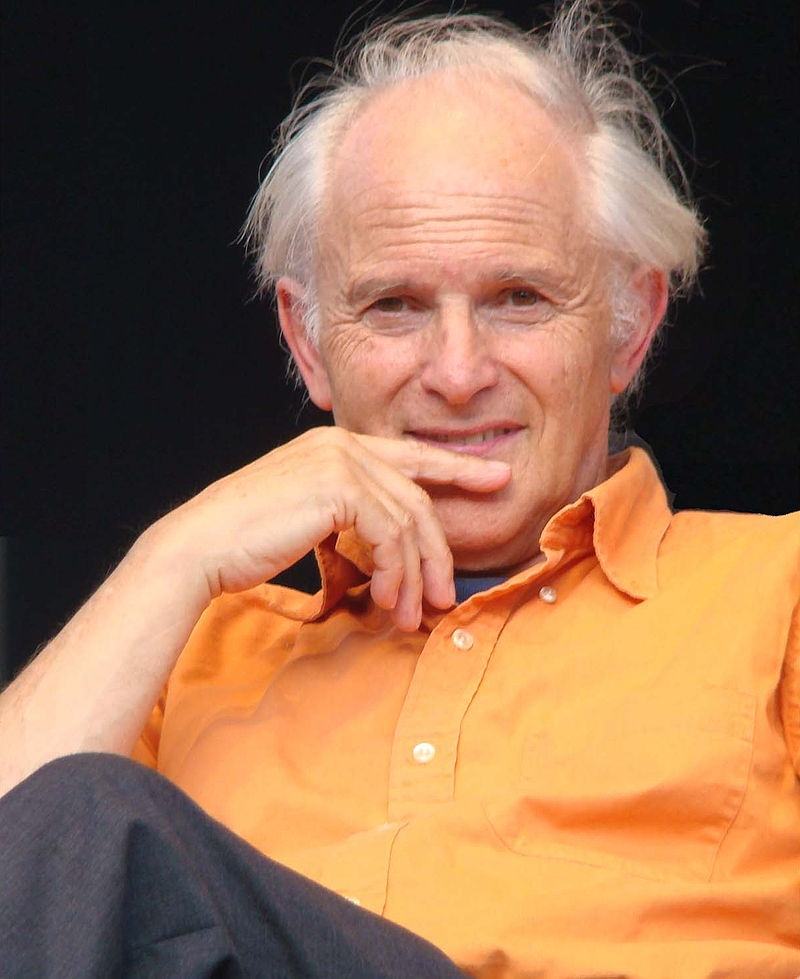
On this date in 1939, chemist Harold Walter “Harry” Kroto (né Krotoschiner) was born in Wisbech, Cambridgeshire, England. His parents were both German but had to leave Berlin in 1937 because his father was Jewish. Kroto attended Sheffield University to study chemistry, graduating with honors in 1961 and receiving his Ph.D. in 1964. He did postdoctoral research at the National Research Council in Canada and Bell Laboratories in the U.S.
He returned to England in 1967 to teach at the University of Sussex and research carbon chains in interstellar space. Aware of the laser spectroscopy work being done by Richard Smalley and Robert Curl at Rice University in Texas, Kroto contacted them and suggested they use the Rice apparatus to simulate the carbon chemistry that occurs in the atmosphere of a carbon star. The experiment supported their theory and revealed an unexpected result, the existence of a new molecule, the C60 species, aka buckminsterfullerene (buckyballs). The discovery earned Curl, Kroto and Smalley the shared Nobel Prize in Chemistry in 1996. “Sir” soon preceded his name when he was knighted that year.
In 2004 he joined the faculty at Florida State University as a professor of chemistry, where he continued his work on carbon and spearheaded the development of GEOSET (Global Educational Outreach for Science, Engineering and Technology). GEOSET is a growing online cache of video teaching modules that are available for free.
In 1963 he married Margaret Henrietta Hunter, also a student of the University of Sheffield. They had two sons, Stephen and David. A humanist and professed atheist, he once joked, “The only mistake Bernie Madoff made was to promise returns in this life.” (According to A.C. Grayling in The Guardian, July 1, 2009)
He died at age 76 in Lewes, East Sussex, from complications of amyotrophic lateral sclerosis. (D. 2016)
PHOTO: By Pd1000 under CC 3.0.
“I am a devout atheist — nothing else makes any sense to me and I must admit to being bewildered by those, who in the face of what appears so obvious, still believe in a mystical creator.”
— From Kroto's Nobel Prize autobiography (1996)
Tim Minchin
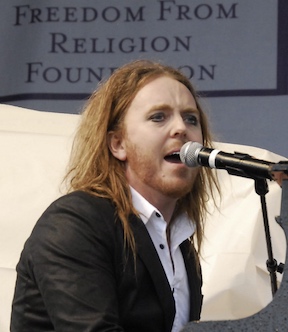
On this date in 1975, Timothy David Minchin was born in Northampton, England, to Australian parents. On his website he describes himself as a “comedian, actor, composer, songwriter, pianist, musical director and huge rock ‘n’ roll megastar.” He grew up in Perth, Australia, where he attended the University of Western Australia and received a bachelor of arts in English and theater in 1995. He went on to obtain an advanced degree in contemporary music at the Conservatorium of Western Australia in 1998.
In 2002 he began his career as a musical comedian in Melbourne in shows where he sang original songs while accompanying himself on piano and incorporating more traditional stand-up elements. Minchin came to prominence at the Melbourne International Comedy Festival in 2005 and went on to win the Perrier Newcomer Award at the Edinburgh Fringe Festival that same year. Living in London, he toured the United Kingdom, Australia, New Zealand and North America. He has also written the book and lyrics for the Royal Shakespeare Company’s adaptation of Roald Dahl’s “Matilda,” which premiered in Stratford-upon-Avon in December 2010.
Minchin is outspoken in his opposition to religion and to nonscientific claims made by New Age groups and others. His comedy and songs cover a wide range of topics, from love and sex to political controversies and language use, but a primary focus is on religion. Many contain strong language but some are safe for radio play, including “Peace Anthem for Palestine,” which Minchin says sums up his views on religious conflict: “We don’t eat pigs, you don’t eat pigs, it seems it’s been that way forever. So if you don’t eat pigs and we don’t eat pigs, why not not eat pigs together?”
He does express fondness for the music of his upbringing in the Anglican Church and the secular and family aspects of Christmas in the Southern Hemisphere in his 2009 single “White Wine in the Sun.” But its hard-hitting lyrics created a firestorm in Australia when the song was released as part of a charitable seasonal album in 2010. Themes of his work include his contempt for unscientific thinking (“If You Open Your Mind Too Much Your Brain Will Fall Out (Take My Wife)” and for the beauty of scientific thinking in the comedy routine “Tony the Fish.”
Minchin returned to touring in 2019 after a seven-year break. The BACK tour visited Australia and New Zealand in March and April, with performances scheduled in October and November in Europe.
PHOTO: Minchin at the 2012 Reason Rally; FFRF photo by Andrew L. Seidel.
"And yes I have all of the usual objections
To the miseducation of children who, in tax-exempt institutions,
Are taught to externalize blame
And to feel ashamed and to judge things as plain right and wrong
But I quite like the songs. "— Minchin, “White Wine in the Sun,” (2009)
Joe Hill
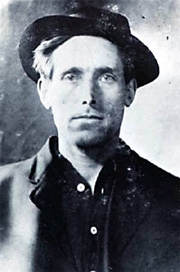
On this date in 1879, union organizer and songwriter Joe Hill (né Joel Hagglund) was born in Gavle, Sweden. His parents were devout Lutherans who enjoyed music, filling their home with song. Only 9 when his father died, Hill had to leave school and go to work to help support the family. At 20 he was diagnosed with skin and joint tuberculosis. His mother died of complications from a back operation when Hill was 22 and he and a brother emigrated to America.
He worked at various laborer jobs and as a union organizer while writing songs about the working class that became part of the International Workers of the World’s (the Wobblies) “Little Red Song Book.” Hill’s songs include “The Tramp,” “There Is Power in the Union,” “Rebel Girl” and “Casey Jones, Union Scab.” His irreverent classic, “The Preacher and the Slave,” parodied the hymn “In the Sweet Bye and Bye” and lampooned the Salvation Army as the Starvation Army. (See lyrics below and listen here to Utah Phillips singing it.)
In 1914 a Utah grocer and his son were killed in their store and police picked up Hill, an unpopular newcomer to the Utah scene who had just been treated for a gunshot wound by a physician. Hill didn’t help himself, refusing (gallantly, his defenders maintained) to provide details about his alibi involving being shot in a woman’s room by a rival. Although the evidence was circumstantial and contradictory, he was found guilty. An international outcry ensued. Helen Keller came to his defense. President Woodrow Wilson intervened twice to try to prevent the execution but on Nov. 19, 1915, he was executed.
Just before his death he had written to the former president of the Western Federation of Miners, Bill Haywood, “Goodbye Bill: I die like a true rebel. Don’t waste any time mourning, organize!” Then he quipped, “It is a hundred miles from here to Wyoming. Could you arrange to have my body hauled to the state line to be buried? I don’t want to be found dead in Utah.” Following his wishes, his ashes were distributed to every IWW local except for the one in Utah. More than 30,000 people attended his funeral. According to an article in the Deseret Evening News, “No creed or religion found a place at the service. There were no prayers and no hymns, but there was a mighty chorus of voices singing songs written by Hill.”
The mournful but hopeful ballad “Joe Hill,” written by Alfred Hayes and set to music by Earl Robinson, commemmorates his work: “I dreamed I saw Joe Hill last night / Alive as you and me / Says I but Joe you’re ten years dead / I never died says he / I never died says he.” … “From San Diego up to Maine / In every mine and mill / Where workers strike and organize / It’s there you’ll find Joe Hill / It’s there you’ll find Joe Hill.” (D. 1915)
The Preacher And The Slave
Long-haired preachers come out every night
Try to tell you what’s wrong and what’s right;
But when asked about something to eat,
They will answer in voices so sweet:Chorus:
You will eat, by and by,
In that glorious land in the sky.
Work and pray; live on hay.
You’ll get pie in the sky when you die. (That’s a lie!)Oh, the Starvation Army they play
And they sing and they clap and they pray
Till they get all your coin on the drum,
Then they’ll tell you when you’re on the bum.If you fight hard for children and wife,
Try to get something good in this life,
You’re a sinner and bad man, they tell;
When you die you will sure go to Hell.Holy Rollers and Jumpers come out,
And they holler, they jump, and they shout.
“Give your money to Jesus,” they say,
“He will cure all diseases today.”Working folk of all countries, unite!
Side by side we for freedom will fight.
Then the world and its wealth we have gained,
To the grafters we’ll sing this refrain:You will eat, by and by,
When you’ve learned how to cook and to fry.
Chop some wood — ’twill do you good.
And you’ll eat in the sweet by and by. (That’s no lie!)— Lyrics by Joe Hill
Joy Behar

On this date in 1942, Joy Behar (née Josephina Victoria Occhiuto) was born in Brooklyn, N.Y. Behar earned a bachelor’s in sociology from Queens College (1964) and a master’s in English education from the State University of New York at Stony Brook (1966). She taught high school English in the late 1960s and early 1970s before becoming a stand-up comedian and radio talk show host. She appeared in “Manhattan Murder Mystery” with Woody Allen in 1993.
Behar is perhaps best known as an original cast member of the daytime show “The View.” It debuted in 1997 has been nominated for Daytime Emmy Awards for Outstanding Talk Show almost every year since, winning in 2009. Joy Shtick — Or What Is the Existential Vacuum and Does It Come with Attachments? (1999) features her humorous essays. Her children’s book, Sheetzucacapoopoo: My Kind of Dog, was published in 2006. She was a frequent guest host on CNN’s “Larry King Live” from 2007-09.
In 2009 she launched her own evening talk show, “The Joy Behar Show,” on CNN’s HLN network. Behar has one daughter, Eve, from her marriage (1965-81) to Joe Behar. She has been with partner Steve Janowitz since 1982.
Raised Catholic, she now identifies as agnostic. She jokingly said she lost her faith when she “went to the Commie school Queens College.” She told an ABC News’ “Focus on Faith” interviewer in 2011, “I’m sustained by my family, my life, my brain. But I don’t believe there’s an afterlife.” In the same interview, she said, “I never gave [my daughter] any religion, because I felt that I was brainwashed.”
“I’m pathetically pragmatic. … I don’t believe that there’s a higher power that created human beings.”
— Behar interview with Fr. Edward Beck, ABC News "Focus on Faith" (March 17, 2011)
Dan Savage
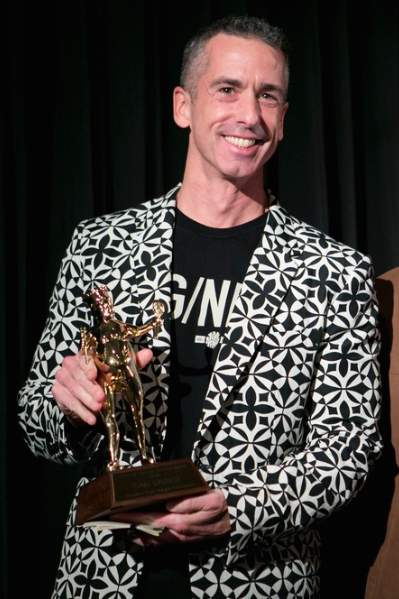
On this date in 1964, gay rights activist and writer Daniel Keenan Savage was born in Chicago. Savage is famous for his sex advice column “Savage Love,” which is syndicated in more than 70 publications. He is also known and respected for his longtime advocacy for LGBT rights. He drew media attention in 2012 when he gave a talk to a conference of high school students and encouraged them to “ignore the bullshit in the bible about gay people.”
Savage earned degrees in theater and history from the University of Illinois at Urbana-Champaign. He later moved to Madison, Wis., where he met Tim Keck, the co-founder of the popular satirical newspaper The Onion in 1991. Keck asked Savage to write an advice column for the paper. Savage agreed and the column eventually became “Savage Love.”
In 2010 he and his husband Terry Miller started the “It Gets Better” project in response to a series of teens who committed suicide because they were bullied about their sexual orientation. Over 150,000 people submitted videos encouraging LGBT teens that their lives will improve and they will find acceptance. The videos have received over 50 million views, and many prominent people such as President Barack Obama, Ellen DeGeneres and the singer Kesha submitted one.
Savage and Miller married in 2005 in British Columbia and renewed their vows in 2012 when Washington state legalized same-sex unions. They have a son, D.J., adopting him as an infant in 1998. D.J.’s homeless birth mother chose them from a group of 80 prospective parents profiled by a Washington-based agency.
Savage was named Humanist of the Year by the American Humanist Association in 2013, the same year he attended FFRF’s national convention to accept an Emperor Has No Clothes Award. (Read his acceptance speech, “The Day My Catholic Family Fell Apart Fast.”)
"My father was a Catholic deacon, my mother was a lay minister and I thought about becoming a priest. I was in church every Sunday for the first 15 years of my life. Now I spend my Sundays on my bike, on my snowboard or on my husband. I haven't spent my post-Catholic decades in a sulk, wishing the church would come around on the issue of homosexuality so that I could start attending Mass again. I didn't abandon my faith. I saw through it. The conflict between my faith and my sexuality set that process in motion, but the conclusions I reached at the end of that process — there are no gods, religion is man-made, faith can be a force for good or evil — improved my life. I'm grateful that my sexuality prompted me to think critically about faith. Pushed out? No. I walked out."
— Savage, quoted in "What God Wants," The New York Times (April 14, 2013)
Roy Zimmerman
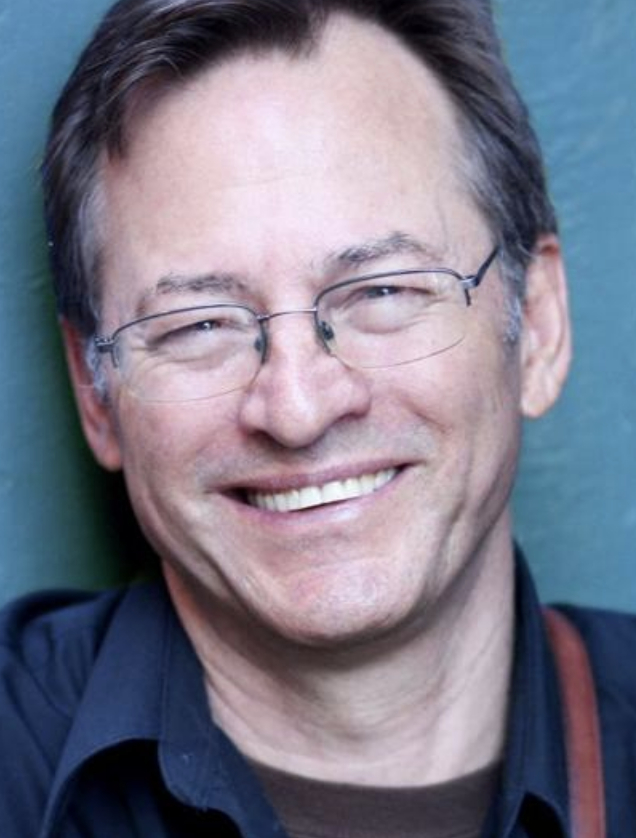
On this date in 1957, satirist and singer-songwriter Roy Zimmerman was born in San Francisco and was raised “in a cult,” he quips. “It was called Lutheranism.” After a time as his church’s choir director as a young adult, he “drifted into other waters.”
Zimmerman wrote a series of satirical musical revues in the 1980s that were produced by the San Jose Repertory Theatre, including YUP! (1984), UP the YUP (1985) and YUP It UP! (1986). They parodied the excesses of the evolving yuppie culture in the Silicon Valley. In 1996 he founded a satirical folk quartet named The Foremen that performed at the national conventions of both major political parties.
He continued to work as a solo performer with liberal and irreligious points of view. “I write satire because I want to use humor to do serious work. I’m often accused of preaching to the converted, but I don’t think of it that way. I think of it as entertaining the troops,” Zimmerman said. “If we ever attain a worldwide consciousness of peace and justice, I’ll be happily out of a job.”
He performed at the Rock Beyond Belief concert in 2012 at Fort Bragg, N.C., and at FFRF’s 2017 national convention. His song “The Liar Tweets Tonight” in various versions has had over 11 million video views as of this writing in 2020. In 2019 he released his 10th studio album, “RiZe Up.” He and his wife Melanie Harby have co-written an estimated 1,000 songs, live in Marin County, Calif., and tour extensively. Their best collaboration, Zimmerman said, is their two sons, Joe and Sam.
Harby is an award-winning bluegrass guitar player and was an original Broadway cast member of the musical “Quilters” in 1984. She worked as a guitar tech for Joni Mitchell and was her research assistant on the 31-track “Hits” and “Misses” recording project.
Richard Dawkins has called Zimmerman “a modern-day Tom Lehrer.” Asked if being openly atheist has caused him problems as a performer, he said: “It’s important, I think, to present these ideas, whether they be religious or political or just social satire, in a way that’s inviting, in a way that brings people into your argument. The implicit argument is not here’s what I think and you should think that, too. The implicit argument is here’s what I find absurd, don’t you?” (“Freethought Matters,” Oct. 29, 2020)
On that episode of FFRF’s TV talk show, Zimmerman sang his song “I Want a Marriage Like They Had in the Bible” and commented, “As Dan [Barker] was saying, if people were to harken to what the bible actually has to say about marriage, they’d be horrified. For you and I actually read the bible. A lot of believers don’t.”
Freedom to oppress
In the name of righteousness
Religious freedom to scratch where it itches
Religious freedom to burn our own witches.— Chorus of the 2015 Zimmerman-Harby song "Religious Freedom"; D.C. Anderson photo
